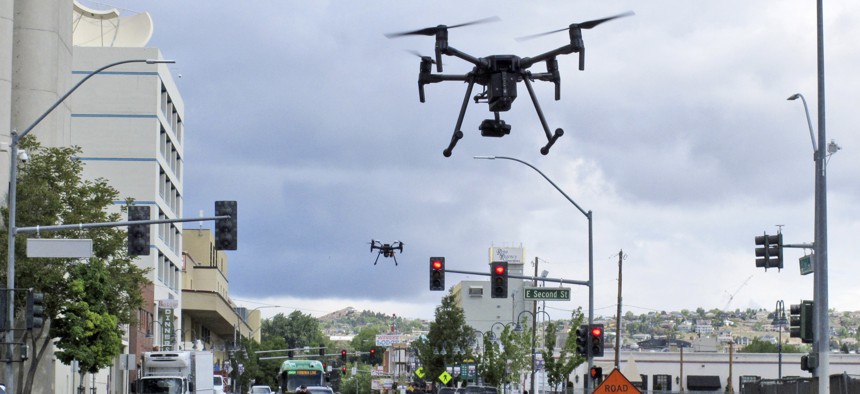Connecting state and local government leaders
To address security risks, a task force recommends that Congress authorize local law enforcement to take down drones flown too close to airports.
State and local law enforcement agencies should be trained and given the authority to take down drones that intrude on commercial airspace, a new task force recommends in a report that highlights existing security gaps at U.S. airports.
To enable local law enforcement to protect airports, the Blue Ribbon Task Force on Unmanned Aircraft System (UAS) Mitigation at Airports recommends Congress establish a training program to give airports and local law enforcement the ability to capture drones or jam their signals.
Many airports around the country do not have the resources or ability to monitor drones flown near airports that could enter aircrafts’ flight paths, said former Federal Aviation Administration leader Michael Huerta as he announced the report’s findings on the tarmac of the Los Angeles International Airport on Wednesday. Meanwhile, federal authorities do not have the resources or manpower to track and disable drones on a daily basis at the nation’s airports, he said.
“In the absence of a federal role, a security gap will continue to exist at many airports across the United States and Canada,” Huerta said. “This is something we cannot have.”
Since 2016, more than 200 drones have been sighted at or near LAX alone, many coming within 300 feet of an aircraft, said Los Angeles World Airports CEO Deborah Flint. Of those reports, authorities have identified the drone’s operator in only one instance, she said.
In the United Kingdom, drone reports at Gatwick Airport in December closed down one of the world’s busiest runways for 33 hours and led to cancellation of 1,000 flights.
Only federal authorities in the United States are currently authorized to intercept drones. Interdiction of drones can include radio-link or GPS jamming, taking control of the device, or taking it out of the air with lasers, electromagnetic pulses, or projectiles.
The report acknowledges that while the U.S. Department of Homeland Security and the Justice Department have demonstrated the ability to counter drones during large-scale events, they do not have the resources or manpower to do so continuously at airports across the country. Because of this, federal authorities expect that local police agencies will initially respond to any drone reports at airports, Huerta said.
Therefore, local law enforcement are required to respond to drone reports even though they don’t have the capabilities to interdict the unmanned aircraft. Only once local authorities’ resources are “exhausted” will federal authorities deploy, Huerta said.
“Local law enforcement lacks the authority and resources to mitigate drones in real time, effectively ensuring any response will fall short and require federal action that will unlikely be timely enough to actually mitigate the threat,” Huerta said.
The report recommends establishing a pilot project, involving at least six airports, that would allow for establishing protocols to respond to reports of drones, as well as providing training and practice exercises for local law enforcement to engage with the devices.
“Interdiction should always be a last resort—to date, most UAS incursions have been halted when the UAS operator is identified and told to land the errant UAS,” the report states. “Nevertheless, local and state law enforcement working in and around airports, including flight pathways, need to have the ability to use interdiction technologies should the risk circumstances absolutely require that course of action.”
The report also recommends that Congress provide the FAA the resources needed to lead drone monitoring efforts around the nation’s airports.
“As is the case with many other operations at airports, such as airport security, unmanned aircraft detection should be a shared responsibility between airports and federal authorities,” Huerta said.
Growth in the unmanned aircraft system market has created “operational challenges” regarding their integration into airspace, according to the FAA. Approximately 900,000 amateur drone users had registered with the FAA as of December 2018 and the agency estimates there are roughly 1.25 million non-commercial drones in use across the country. Commercial drone use is expected to triple to 835,000 aircraft by 2023.
“We are hopeful the recommendations from this report will help airports prepare and have understanding of current best practices to be able to respond to the threats,” Flint said. “This is a call to action for airports, for agencies, and Congress alike to be the most prepared through this lens of a shared responsibility.”
Earlier this year, the chairman and ranking member on the Senate’s Commerce, Science, and Transportation Committee called on the FAA to publish a proposed rule that would allow for the remote identification of drones. They said this would enable the FAA, law enforcement and others “to remotely track and identify drones and their operators during flight.”
During a hearing before the committee in June, airport representatives and drone experts testified about the challenges they face responding to drone reports at local airports and the need for additional authority at the local level. An FAA official said that the agency was working to complete a rule that would require remote identification for all UAS users, technology that could help local law enforcement address potential drone threats.
Andrea Noble is a staff correspondent with Route Fifty.

NEXT STORY: The Metro Areas Where Economic Output Rivals Whole Countries



